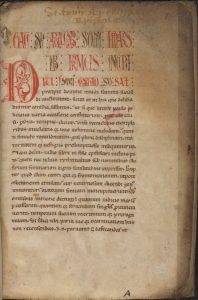The project has now been running for about five months, and we have reached a milestone of sorts recently with the departure of our summer undergraduate research assistants. The generosity of the Faculty of Arts at UBC allowed me to hire two very talented undergraduate students through the International Work Learn Award program. They have done extensive work on building the two databases that will form the backbone of the project, as well as helping me with some other smaller projects.
Alexandra Ore has been busy putting together the database of pre-600 Latin codices. This database, which consists of over 500 items, pulls information from the NUI Galway project, Earlier Latin Manuscripts, as well as Trismegistos. To the information in these two resources, Alexandra has added (where possible) detail about origin and provenance of individual items, as well as tracking how much digital coverage is available (whether the item has been digitised in full, in part, or not at all). Over the coming two years of the project, we will add greater detail about physical characteristics not always recorded for early Latin codices, such as column width, width between columns, margin sizes, evidence for binding, and so on. A great deal of this work will be done from digital facsimiles where they are available, and Alexandra’s heroic work has made it possible for us to get going on this very quickly.

Beginning of Sidonius Apollinaris Epistulae, British Library Harley 4084, f 1r. France, S., 2nd half of the 12th century. Public domain image.
Ches Walton’s summer project focused more on the literary and philological side of things. Initially, Ches spent some time getting to know the fifth-century bishop and author Sidonius Apollinaris, and finding and categorizing references to books as objects, libraries, and related topics in his letters and poems. This research has been used by the PI in an ongoing project on books as cultural artefacts in the fifth century CE, which will be completed later this year.
After working through the extensive writings of the bishop of Auvergne, Ches began contributing to the other major database of the project, which will eventually contain all references to books as physical objects in pre-600 Latin and Greek literature. Ches has been working through the Thesaurus Linguae Latinae entries for membrana (“parchment”) and related words, finding instances in which this word is being used to refer to parchment books. Ultimately, we hope to be able to identify whether there is any change over the first five centuries CE in how books are described. The existence of the TLL entries for many of the words expedites matters considerably, but we will eventually get on to words that have not yet been included in the Thesaurus.
It has been a busy but productive summer. Ches and Alexandra are now focusing on their final year of undergraduate study, and I am incorporating their findings into my research and training in two new graduate research assistants – on whom more later!
– Cillian O’Hogan
